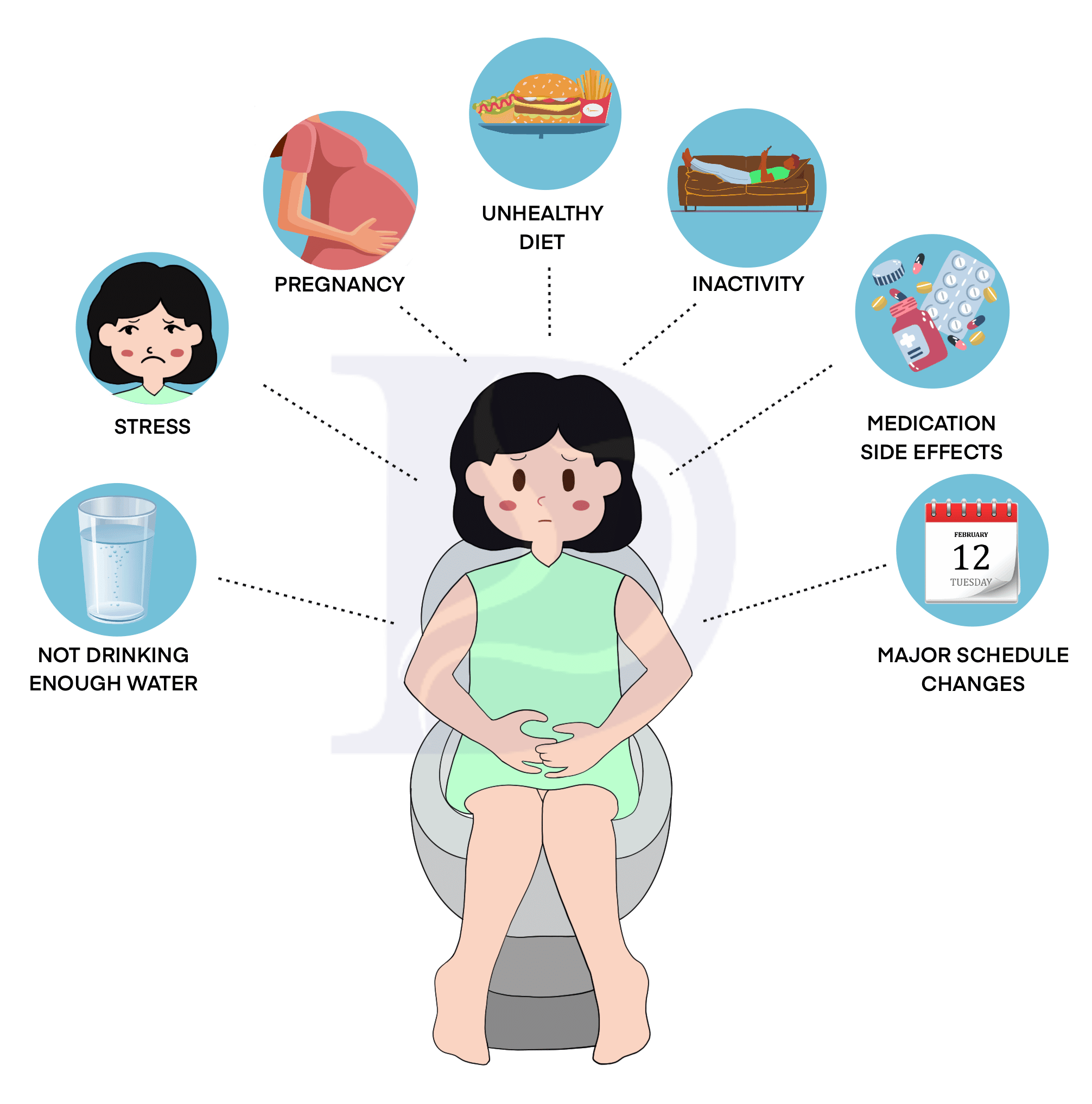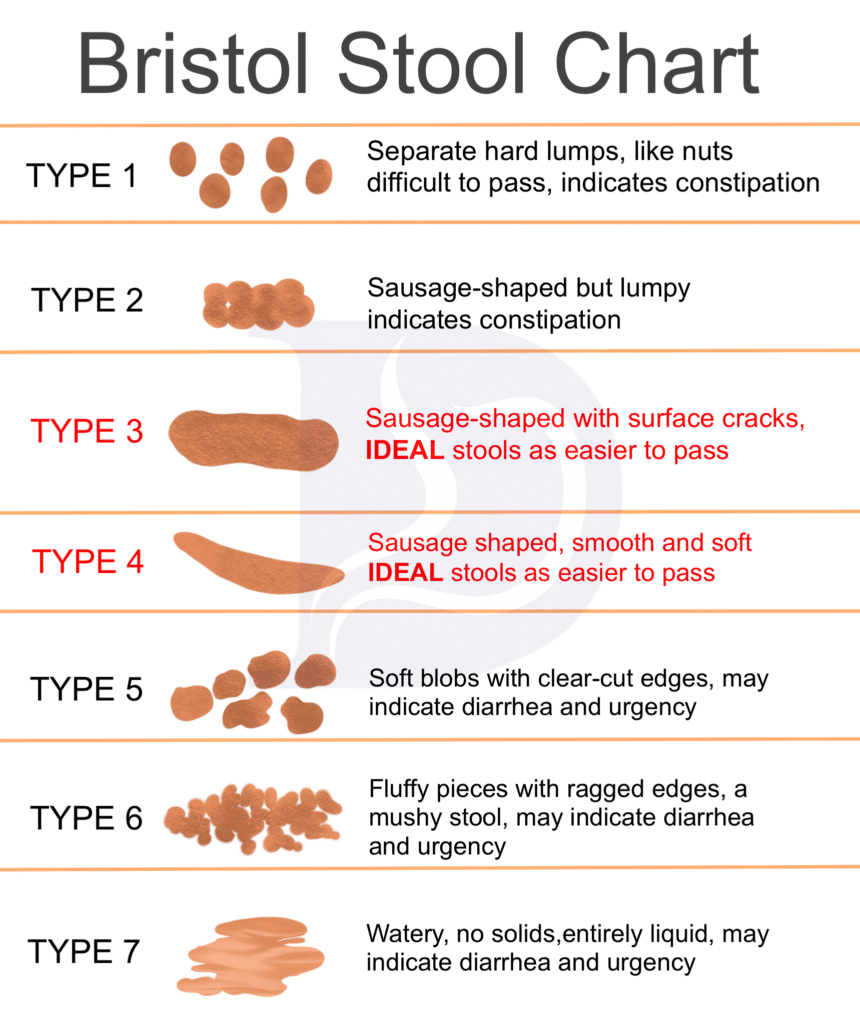Constipation is typically diagnosed when a person has less than three bowel movements a week, in addition to fecal material that is hard, lumpy, and dry in consistency. Stools are difficult to pass due to this consistency1.
A good bowel regimen typically involves 1-2 soft, formed stools daily. Constipation can be an acute issue, or can occur longterm for many weeks, months or even years. The GI care team at Digestive & Liver Health Specialists offers many tests and treatment options for constipation, that are customized to each individual patient’s needs.
Causes of Constipation
The stomach’s role in digestion is to mix and liquefy ingested food. This food then enters the small intestine in a semi-solid form. While in the small intestine, nutrients, vitamins, and minerals are absorbed. The food then travels onward to the large intestine, where any necessary remaining nutrients are absorbed, along with water. When an excessive amount of water is absorbed through the large intestine, stools can become hard and dry, leading to constipation. Dehydration, particularly from lack of adequate daily water intake, can also lead to constipation2.

Following causes may lead to constipation.
- Lack of exercise can lead to less motility of the large colon
- Medications (both prescription and over-the-counter)
- Overeating
- Caffeine abuse
- Psychological and neurological issues
- Irritable bowel syndrome
- Travel or any changes to a routine daily bowel regimen
- Low dietary fiber intake
- Certain diseases that lead to decreased colonic motility.
- Processed foods
- Pregnancy3
Diagnosis
The following can help to diagnose constipation:
History: Patient history is the most critical factor in determining constipation. The physician will perform a complete examination and blood tests if needed. The Bristol Stool Chart is also helpful towards identifying specific stool characteristics.
X-ray: Barium x-ray of the lower bowel or rectum helps detect constipation.
Colonoscopy: colonoscopy helps view the bowel and obtain biopsy samples of targeted areas.
X-ray Marker: A capsule is swallowed by the patient, which goes into the colon; after a few days, an X-ray is performed, which helps detect constipation.
Manometry: This technique is used to measure and note the pressure in the colon and rectum, which helps diagnose specific types of constipation.
Prevention and Treatment
Treatment will vary according to severity and etiology. The first step is always to relieve acute constipation, while for chronic constipation, your provider may suggest medications, laxatives, and long-term diet changes.
On a general basis, the following treatment and preventive measures are suggested4:
- Eat regular, small meals frequently compared to 2-3 daily large meals.
- Proper daily water intake.
- Regular exercise and aerobic exertion.
- Avoiding junk and processed food.
- Surgical correction can be considered in extreme cases.
Dietary Modification
Food that is high in fiber, bran, or roughage is recommended. In countries where low unprocessed food consumption and a large amount of fiber is consumed, constipation is rare. The following foods should be included in the diet plan to improve constipation5:
Vegetables: Root (potatoes, carrots, turnips), leafy green (lettuce, celery, spinach), or cooked high residue (cabbage).
Fruits: cooked, fresh, or stewed fruits.
Bulking Agents: Fiber absorbs the water and makes stools softer and easier to pass.
Bran: Wheat, oat, rice, psyllium bran is quite effective in relieving constipation.
Methylcellulose: this is also a plant-based fiber with a water holding capacity.
Laxatives: There are two main laxatives; osmotic and stimulants. Milk of magnesia, ethylene glycol, and lactulose are often used.
WHAT YOUR POOP SAYS ABOUT YOUR HEALTH

Summary:
Constipation can be a short-term issue, or a chronic issue which lasts for months or even years. There are many tests that can be performed to determine the exact cause of your constipation, and an appropriate treatment plan will also be designed based on the cause. No matter the reason for constipation, remember that it is always helpful to regularly exercise and to ensure proper fiber intake, water intake, and consumption of healthy foods.

